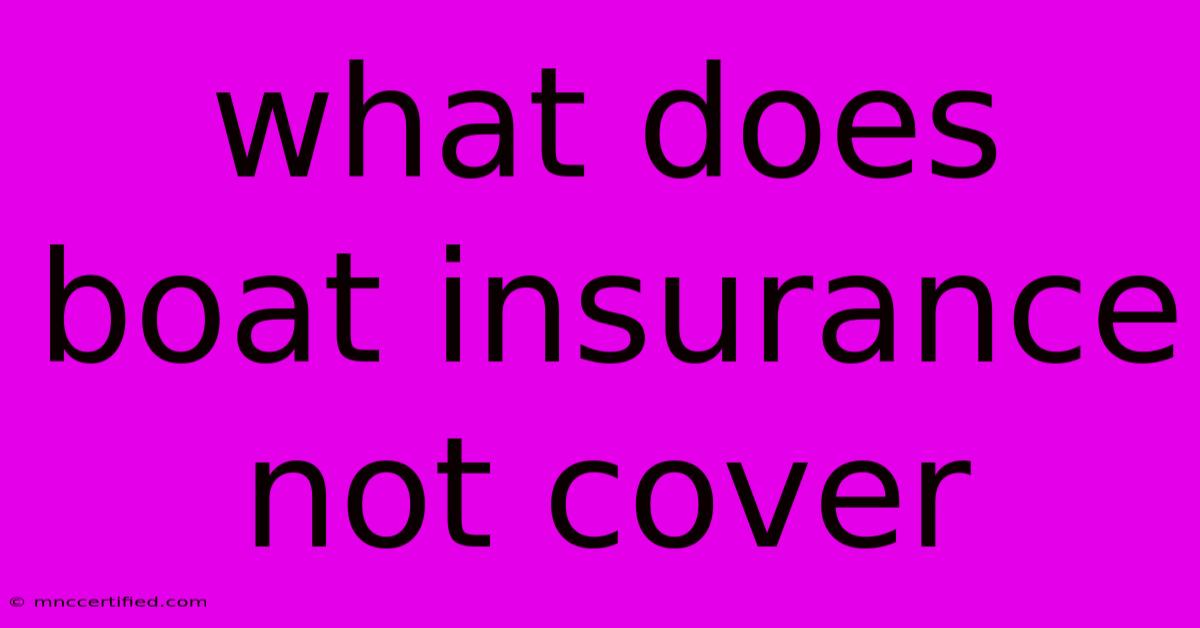What Does Boat Insurance Not Cover

Table of Contents
What Does Boat Insurance Not Cover? A Comprehensive Guide
Owning a boat is a dream for many, offering freedom, adventure, and relaxation on the water. However, before you set sail, understanding your boat insurance policy is crucial. While boat insurance provides vital protection, it's not a blank check. This comprehensive guide will explore the common exclusions and limitations often found in boat insurance policies, ensuring you're fully informed and prepared.
Common Exclusions in Boat Insurance Policies
Many assume boat insurance covers everything that could go wrong. This is a misconception. Several situations and damages are typically excluded from standard policies. Understanding these exclusions is key to avoiding unexpected financial burdens.
1. Pre-existing Conditions
Similar to health insurance, boat insurance generally won't cover pre-existing damage or defects. If your boat had a known problem before the policy started, repairs resulting from that problem likely won't be covered. Always disclose any existing issues honestly during the application process.
2. Wear and Tear
Normal wear and tear is not covered by boat insurance. This includes things like fading paint, minor scratches, or gradual deterioration of parts due to age and use. Think of it like the wear and tear on your car – routine maintenance is your responsibility.
3. Negligence and Recklessness
Insurance policies typically exclude damages resulting from your own negligence or reckless behavior. For example, if you damage your boat due to operating it under the influence of alcohol or drugs, or deliberately run it aground, your claim might be denied. Safe boating practices are essential.
4. Acts of God
While some policies offer coverage for certain weather events, others might exclude damages caused by "Acts of God," such as hurricanes, tornadoes, or floods. Check your policy carefully to understand the specific coverage related to severe weather. Consider supplemental coverage for extensive weather damage.
5. Unlicensed Operation
Operating your boat without the proper licenses or certifications can void your insurance policy. Ensure you and anyone operating your boat have the necessary licenses and are following all applicable boating regulations.
6. Mechanical Breakdown
Basic boat insurance usually doesn't cover mechanical breakdowns. This often requires separate mechanical breakdown insurance or a warranty. Regular maintenance and proactive repairs can minimize the risk of costly breakdowns.
7. Theft of Personal Belongings
While your boat might be covered against theft, personal belongings on board often require separate coverage. Consider adding a rider to your policy for valuable items kept on your boat.
8. Damage to Uninsured Vessels
If you cause damage to another uninsured vessel, your coverage may be limited. Understanding your liability limits and the implications of hitting an uninsured boat is crucial.
Understanding Your Policy's Limitations
Beyond specific exclusions, it's vital to understand the limitations within your boat insurance policy. These can include:
- Deductibles: The amount you pay out-of-pocket before insurance coverage kicks in.
- Coverage Limits: The maximum amount your insurance company will pay for a covered claim.
- Geographic Limitations: Certain policies might only cover you within a specific geographic area.
How to Maximize Your Boat Insurance Coverage
To ensure you're adequately protected, consider the following:
- Choose the Right Coverage: Assess your needs and choose a policy with sufficient liability and hull coverage.
- Read Your Policy Carefully: Don't just skim it; thoroughly review all clauses, exclusions, and limitations.
- Ask Questions: Don't hesitate to contact your insurance provider to clarify anything you don't understand.
- Regular Maintenance: Preventative maintenance can significantly reduce the likelihood of claims.
By understanding what your boat insurance doesn't cover, you can make informed decisions, protect your investment, and enjoy your time on the water with peace of mind. Remember to always prioritize safe boating practices and communicate openly with your insurance provider.

Thank you for visiting our website wich cover about What Does Boat Insurance Not Cover. We hope the information provided has been useful to you. Feel free to contact us if you have any questions or need further assistance. See you next time and dont miss to bookmark.
Featured Posts
-
Chinese Carrier Spotted By Us Satellite
Nov 23, 2024
-
Mendes Mayulu Absent Psgs Lineup Hit
Nov 23, 2024
-
Lord Abbett Municipal Bond Fund
Nov 23, 2024
-
Crypto Lead In To Coin Nyt Mini
Nov 23, 2024
-
Health Alert Ringworm Cases Rise
Nov 23, 2024